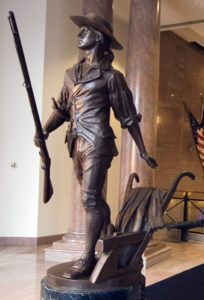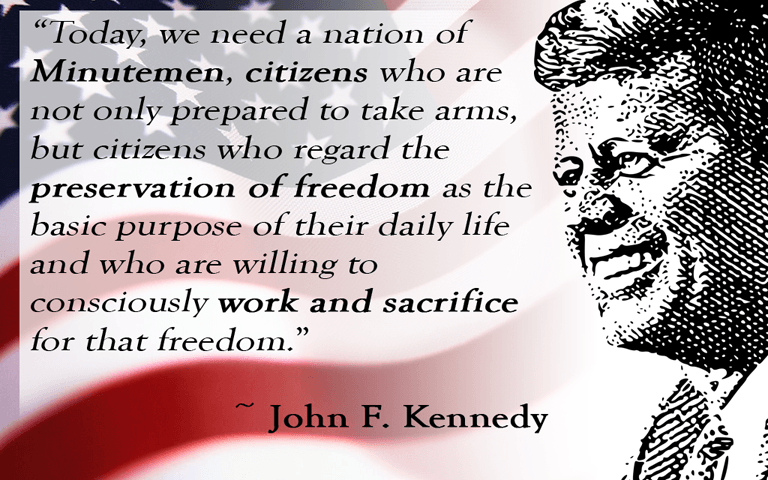Minutemen were a special unit of colonial militia who were ready for battle at a minute’s notice. Officially formed into battalions of “Minute-Men” by the Virginia convention in 1775, these frontier men received specialized training in addition to a hunting shirt, leggings and 20 shillings per year for the maintenance of their firearm[1]. They were accurate riffle hunters and were skilled at Indian-style field scuffling[2], which made them formidable adversaries. First of all they were able to fire their riffles at a greater distance than the British. Also, they were able to reload faster than the British. And lastly, their riffles could be fitted with bayonets, allowing them to go without swords and still fight at close range.
Minutemen Legacy
Their most extraordinary legacy is in part that they became soldiers first, placing God and country above all else, but mostly their legacy is that at first they were ordinary men. Minutemen were civilians who wanted to secure their lives and their property as well as their right to do so. They made sacrifices in their daily lives including what they planted and where they lived, as a result these were decisions that also affected what food they ate, what produce they sold at market and their quality of living[3]. When ordinary men and women do ordinary things in extraordinary ways their actions become the very definition of heroism. While some minutemen were hunters others were farmers, yet all left their station in life to fight for freedom. For this reason, many statues of minutemen depict men in a hunting shirt, carrying a riffle and leaving a plow behind.

How to be a Patriot
It only makes sense that the call for this kind of heroism must remain evergreen if we are to continue realizing the freedoms for which these true Americans fought. For without men and women to keep it alive it means that our ancestors died in vein. It was only fifty-five years ago that president Kennedy called for a return to the principles held by the first minutemen who will regard the preservation of freedom as the basic purpose of daily life, and most importantly, who are willing to work and sacrifice for it[4].

To that end, here are some things you can do to be patriotic.
Five Patriotic things to do:
- Care for our environment from sea to shining sea
- Clean your trash at sporting events and at the movies and it will show others that you care and that they should do the same.
- Recycle
- Vote to preserve liberty by law
- Learn and know the Constitution and amendments so you will know how to vote.
- Vote against unnecessary legislation and frivolous bills because they cause bureaucracy or take away freedom.
- Insist on the good of brotherhood for all
- Do not allow others to suffer because of their race or religious beliefs just because they are not the same as your own.
- Support our troops who are fighting to give others a chance at the same freedoms that we so lavishly enjoy.
- Give witness to truth & protest what is false
- Be prepared to explain why you believe what you believe, not just to prove who is wrong or right, but as a service to those who genuinely desire to know.
- Paint, sing and teach all of the above so that generations to come will see, remember and adopt these precepts.
- Recite the Pledge of Allegiance with your family, and explain it to your children so they will always remember.
- Post the Pledge of Alegiance and/or the Preamble to the Constitution next to your diploma in your office. Especially if a free public education made at least the early years of learning possible. Although free education is recognized globally as a basic human right, the reason why it is not fully constitutionalized is because it is eminently in the state domain. Likewise, learning and teaching are a natural faculty of the human mind and so the right to education falls among those rights recognized by the ninth amendment as a right retained by the people.
[1] Jean Edward Smith. John Marshall: Definer of a Nation, pgs 45-48. Henry Holt and Company 1996 Print
[2] Susan Sales Harkins, William H. Harkins. Betsy Ross, pg 25. Lane Pub., Inc. 2007 Print
[3] Robert A. Gross. The Minutemen and Their World, preface. Macmillan 1976 Print
[4] Message to Those Participating in Roosevelt Day Commemoration, 29 January 1961, “Roosevelt, Franklin D., General” folder, White House Central Subject Files, box 111, John F. Kennedy Presidential Library.
